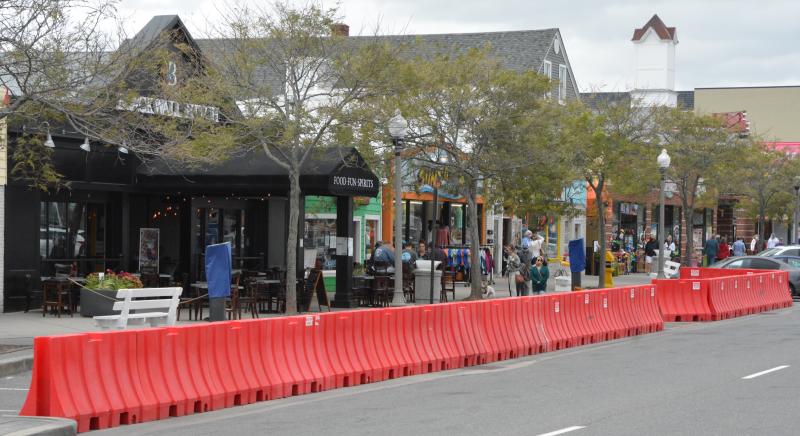Rehoboth Beach to remove barriers beginning Nov. 2
In early May, to accommodate restaurants and COVID-related social distancing, Rehoboth Beach installed barricades along portions of commercial district streets. The city will begin removing those barricades Monday, Nov. 2.
Commissioners made the decision to remove the barriers during a special meeting Sept. 22. City Manager Sharon Lynn made the recommendation, saying the barricades aren’t needed any longer.
In advance of the summer’s tourist season, hundreds of barricades – mostly rented, some purchased – were installed by the city along the first two blocks of Rehoboth Avenue, and specific areas of Baltimore and Wilmington avenues. The majority of the Rehoboth Avenue barricades were removed soon afterward because only a small number of restaurants chose to use sidewalk space for outdoor dining.
Lynn said the city still has 103 of the 300 rented barriers. Beginning Nov. 1, she said, the price to rent the barriers jumps from $15 each to $100. Lynn said the city could buy more, but each one would cost $300, and she is not in favor of buying more.
Lynn said 11 of the 44 restaurants approved for outdoor dining are using the barricades. She said a majority of those restaurants aren’t inclined to continue with outdoor dining once the weather changes, and the others haven’t decided.
It’s a day-by-day thing for them, said Lynn.
In addition to removing the barriers, Lynn recommended removing the access ramps the city installed, which are beginning to crumble, she said. The commissioners agreed with removal of the ramps also.
City Code Enforcement Officer Dennis Jeney said he spoke with people from a majority of the restaurants about removing the barriers and what their plans were moving forward. He said they all agreed outdoor dining was a good thing. Some, he said, told him they wouldn’t have survived if it hadn’t been approved.
“Overall, there’s a lot of uncertainty,” he said.
Earlier this year, Gov. John Carney extended the powers of the Alcoholic Beverage Control Commissioner to allow outdoor dining through March 31, 2021.
Lynn suggested, and the commissioners agreed, that city staff be allowed to work with restaurants to monitor the situation. She said it would be made clear that seating can no longer be up to the edge of the curb, as it is in some areas, but also that some restaurants are going to have different needs from others.
Mayor Stan Mills said he was fine with removing the barriers and understood the fluidity of the situation, but he said he would like some general protocols put in place. For example, he said, there should be a set minimum width of sidewalk in front of a restaurant that has seating up against the exterior wall.
Commissioners are expected to continue discussing outdoor dining logistics at their next special meeting at 3 p.m., Tuesday, Sept. 29. The agenda for this meeting includes discussion on a strategy for businesses to use city public space and private space beyond the business floor plan.




















































